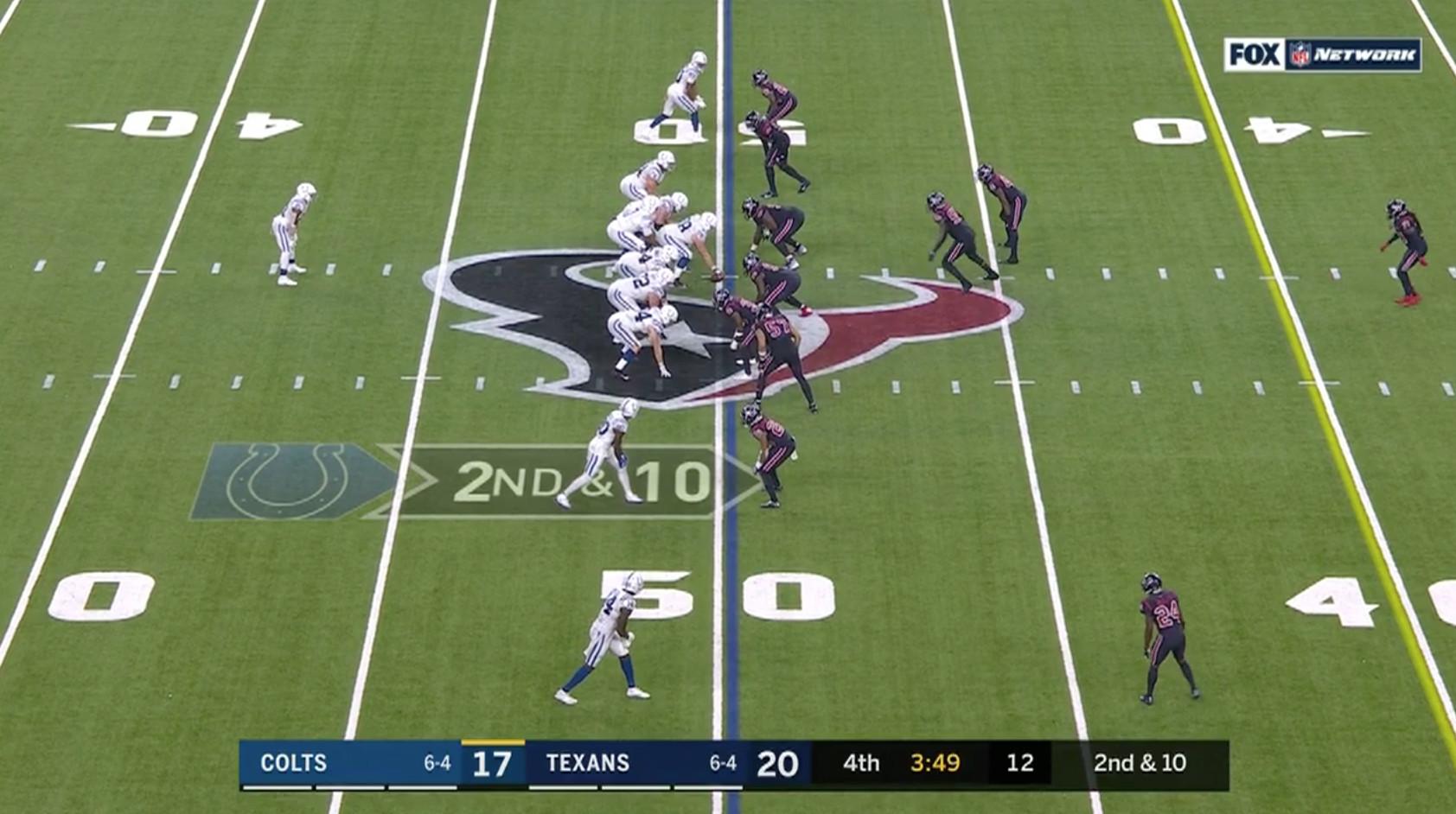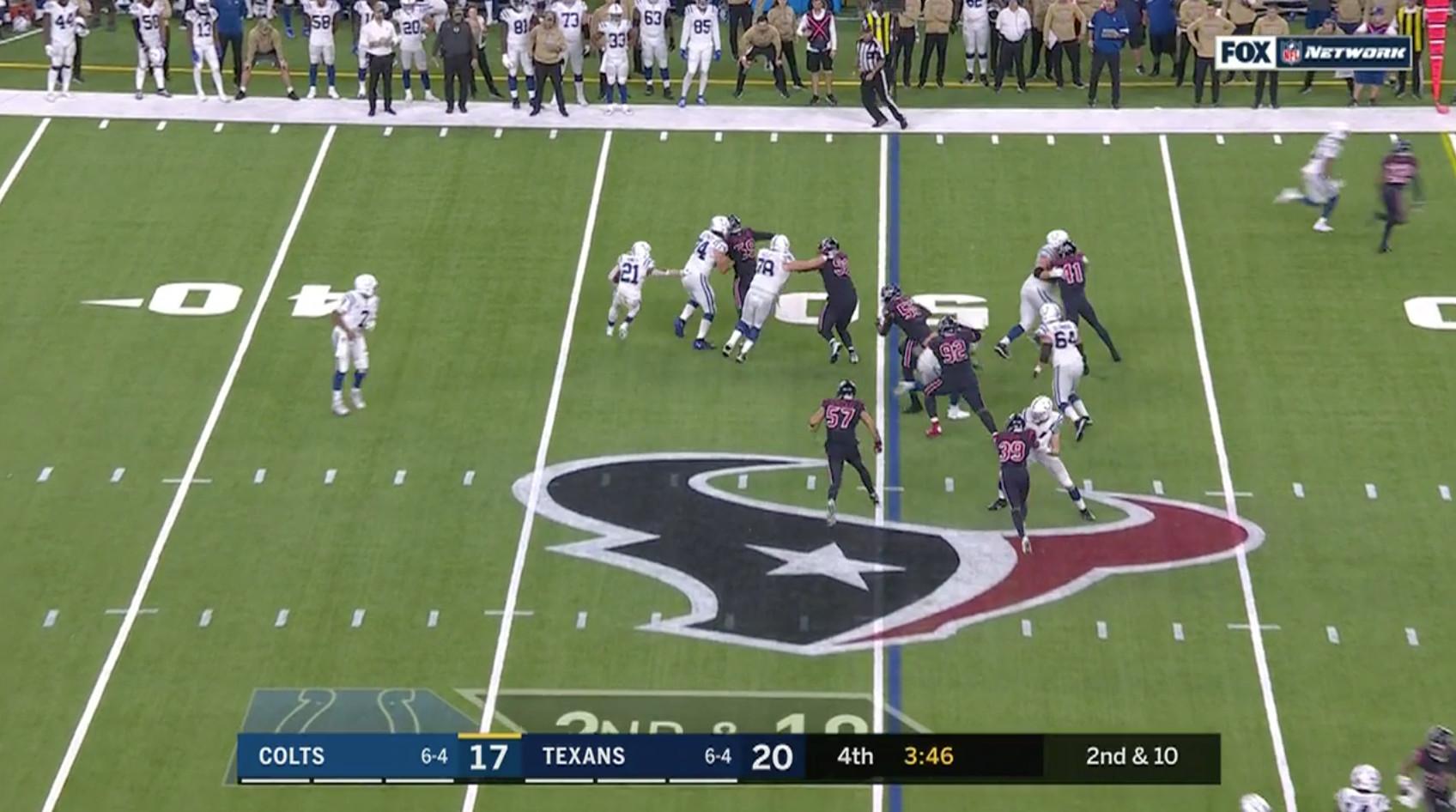It’s cliché to call any matchup before the postseason—or the last week or two of the regular season—a “must-win” game, but the Colts’ Week 12 Thursday Night Football game against the Texans comes close to one. Tied at 6-4 in the AFC South, Indianapolis had more playoff leverage (as modeled by ESPN’s FPI metric) than any team this week:
But not only did the Colts lose, 20-17, they dropped this game in excruciating fashion. Late in the fourth quarter, Indy got the ball down three with a chance to drive for a win, or at least a tie. Then they did almost everything wrong. Frank Reich made a series of mistakes with his play-calling and timeout usage that hurt his team in its most important game of the season, and now the Colts are 6-5—well behind the 7-4 Texans in the division. Indianapolis’s playoff odds now sit around 36 percent. Let’s break down how this all went wrong.
Midway through the fourth quarter, the Colts defense forced a Houston punt, giving Jacoby Brissett the ball back with 7:28 left to play and a three-point deficit. This wasn’t even two-minute-drill territory yet—Indy had all three timeouts and didn’t even need a touchdown. They were in great position to turn the game around.
But Reich called a script of plays that delivered no sense of urgency. The Colts, who had stuck to a run-heavy game plan for much of the night, ran the football on five of their first seven plays on this drive. That burned clock—nearly four minutes in total—turning what could have been plenty of time into a dire situation.
The team’s worst decisions came as the clock ticked closer to the two-minute warning. With 4:24 left and a first-and-10 at midfield, Brissett handed the ball to Nyheim Hines for no gain. Offenses love to run the ball on first down, despite the math showing that this is less efficient than beginning with a pass. It’s an especially egregious choice given that the trailing Colts needed to both conserve clock and try like hell for a lead-changing touchdown—not a tying field goal.
Facing second-and-10, the Colts ran it again, this time for 3 yards. Indianapolis essentially guaranteed itself a third-and-long, in part because running plays pick up fewer yards on average than pass plays and also in part because Houston was ready for this. Look at how the Texans lined up defensively:

They had only one safety back and sent a linebacker rushing toward the line at the snap. When Hines got the ball on this outside run, there was not a lot of space for him to work with:

On the ensuing third-and-7, Brissett fired a low pass to Zach Pascal that was broken up, putting the Colts in real trouble. They were out of field goal range and had just 3:05 left on the clock—not enough to feel comfortable punting it back to the Houston offense. So they elected to go for it, but not before one more mistake: a timeout.
The team didn’t have a plan for the fourth-down play, and calling a timeout burned a chance they’d have to stop the clock if they didn’t pick up the first. The clock wasn’t even ticking at that point—they let precious time slip away on run plays but used a timeout after an incomplete pass. On fourth down, Brissett couldn’t find an open target and tried to scramble with the ball. He was tackled just short, and the Texans offense took the field with 2:49 to go.
From there, the Colts still had a chance to get the ball back, but not before one more error: They let the Texans run the clock all the way down to the two-minute warning. Teams on defense that need to stop the clock to get it back should always use their timeouts before the two-minute warning to save a few seconds. Failing to do so isn’t usually a complete disaster, just a slightly suboptimal move—but this time around, the error cost the Colts a final chance to possess the football.
The Texans eventually drained the clock all the way down to just five seconds left (though not without some controversy) before facing a fourth down. On a fourth-and-3, Deshaun Watson launched a deep pass down the field just to use up the remaining seconds, ending the game. If there had been a bit more time left—i.e., just the few seconds the Colts could have saved had they used their timeout on the right side of the two-minute warning—this wouldn’t have been an option for the Texans. They would have been forced into a punt, and the Colts could have at least gotten one last Hail Mary shot at the end zone. Instead, they never touched the ball again.
The Colts didn’t lose this game solely because of late-game management. A number of important injuries—including to Hilton, running back Marlon Mack, safety Khari Willis, and corner Rock Ya-Sin—didn’t help. Plus, the Colts should be happy to be in this place to begin with. It’s Week 12 and the team whose quarterback retired just weeks before the season is in the playoff hunt. That’s remarkable on its own.
But Reich’s late-game management was an example for coaches everywhere of how not to win a football game. His conservative, run-heavy game plan was far too lackadaisical for the situation, and his timeout usage was nonsense. It cost the Colts a win—and it could cost them a trip to the postseason.
